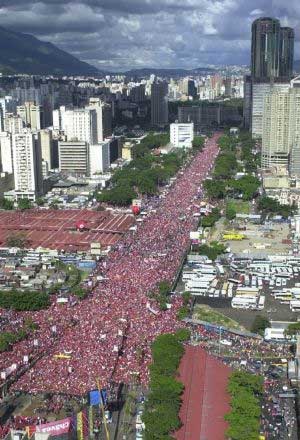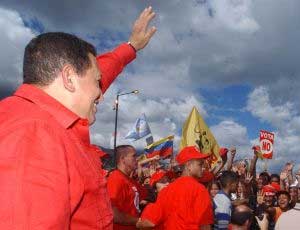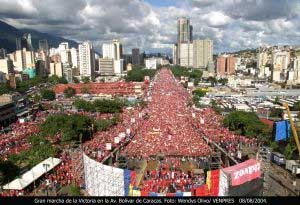On Sunday August 8, the biggest march in the history of Venezuela took place in Caracas. The masses poured onto the streets of the capital in a rousing finale to the campaign on the referendum. This was a resounding reply to all the accusations in the bourgeois press that the Bolivarian Movement had lost its mass base.
To many here it seemed difficult to improve upon the huge popular demonstration of June 6, held immediately after the announcement of the referendum, but once again the masses showed their willingness to fight. The revolutionary movement is not in a declining but an ascending phase.
The atmosphere on the streets of Caracas was like a carnival. There was a mood of euphoria among the people present: overwhelmingly workers and poor people, men and women, old and young, a sea of red shirts, flags and banners. More than a demonstration this was like a victory celebration. The masses have responded magnificently to the call to action and sense that victory is within their grasp. All are now convinced that they have won this particular round in the struggle.
The comrades of the Venezuelan Revolutionary Marxist Current, who have been in the first line of the struggle for a “no” vote, as always participated with our own ideas and slogans. The comrades set up a stall opposite the Museo de los Niños, at the start of the Avenida Bolívar, which was practically full. Moreover, so large was the crowd that a large number of people were unable even to get into the Avenue.
From where we were, one could see the entry to the Avenue absolutely blocked by the human flood. In the course of his speech, President Chávez announced that the multitude stretched right to the Plaza Venezuela, extending even as far as Avenida Universidad. For those who do not know Caracas, this means a distance of several kilometres, filled to overflowing with demonstrators.
 |
The march itself lasted for nine hours. At nine o’clock in the morning there were already people assembling in the Avenida Bolívar (where the march ended) while others began to emerge from La Bandera and other places. The whole city was dressed in red, with banners, placards and posters everywhere. In every street you walked along, you met with people with red shirts decorated with the word NO, chavista slogans or with the image of Che or, in most cases, of Chávez himself.
The taxi driver who drove us to the appointed place with all our material himself carried a number of NO stickers on his vehicle (“so that no escuálido will try to get a lift in my cab”). Such attitudes are highly significant, as is the fact that in the last few days in many of the “camionetas” (a kind of minibus for urban transport) the drivers had plastered the windows of their buses with NO posters.
When we set up our stall at 10am, the number of people present at the end of the demonstration was unusually big, and did not stop growing until about three or four in the afternoon. There were masses of demonstrators passing all the time. The march only ended at about half past six in the evening, after Chávez had finished speaking.
In his speech, President Chávez called on the masses to maintain their patrols and UBES after August 15 and transform them from electoral Battle Units into social Battle Units (Unidades de batalla social). He also delivered a message that sounded very much like a warning to and criticism of the chavista bureaucracy (some of those I spoke to interpreted this as a signal for an impending purge) but at the same time he greeted a number of these leaders, calling on them to continue the battle after August 15, etc.
 |
|
This is the main defect of the chavista movement – its lack of clarity, the lack of a clear and unambiguous programme and perspective. That is its negative side, and one that can have the most serious consequences in the future. But there is also a tremendously positive side: the mobilization of the masses for action. This has a logic of its own. And everyone knows that after August 15 the struggle must continue.
From conversations with key Bolivarian activists I have learnt that they are planning to launch a National Bolivarian front. My impression is that they are seeking to maintain the present structure of the comandos and patrols established during the referendum campaign. In itself this can be a step in the right direction, on condition that these organs are democratically controlled by the rank and file.
However, it is probable that the old bureaucracy of the parliamentary parties will want to keep control of the movement from the top. But this is already meeting stiff resistance from the rank and file working class chavistas and the local leaders who have been thrown up by the movement itself. This contradiction must be resolved, and must be resolved by the victory of the consistently revolutionary and democratic trend.
The rest of Chávez’s speech was a celebration, but he also warned the masses not to fall into triumphalism, that this was the last week of the battle: it was necessary to ensure that people went out to vote and to prevent the opposition from rigging the outcome. At the same time, the President made new appeals to the employers and the middle class to rebuild the country after August15.
It is impossible to reconcile revolution and counterrevolution, just as it is impossible to mix oil and water. At bottom, this is a class question. The movement is under the pressure of class enemies – the oligarchy and imperialism. These pressures will not end after August 15 but will be intensified. The right wing of the chavista bureaucracy would like to compromise with the enemy. The rank and file want to carry the revolution to the end. These inner contradictions will not disappear after August 15. They too will intensify.
In the last few days a bosses’ association which is not part of Fedecámaras (the main employers’ federation that is openly counterrevolutionary and backed the 2002 coup) met with José Vicente Rangel (vice-president of the government) and offered to mediate in a “national dialogue” after August 15. In their declaration they appealed to the employers to “rebuild the country”, and to take advantage of the growth of the economy (which may be as high as 10% this year, or maybe more if oil prices rise further.)
Chávez appealed to the bosses to invest, to keep calm, etc. He tells the big bourgeoisie and even the imperialists that “the only guarantee of stability, economic, social and political equilibrium and peace in Venezuela is the Bolivarian government.” But at the same time he proposes to intensify his programme of social reforms and denounces “savage capitalism”, “neoliberalism” and imperialism. This is clearly unacceptable to the oligarchy and imperialism. Further clashes are inevitable.
However, the balance of class forces at this time is not favourable to the counterrevolution, which is forced to retreat and manoeuvre. Everything seems to indicate that one sector of the bourgeoisie and imperialism (Carter, Cisneros, etc) has understood that to attempt to organize a fraud or not to recognize the results and call for destabilization or a coup at the present time could be the spark that ignites an explosion of the masses and pushes the revolution forward.
Therefore this sector is in favour of recognising a Chávez victory, and to put the brakes on any radicalisation of the situation, to beat a temporary retreat and prepare a strategy for the medium and long term. One possibility is that they are negotiating with a sector of chavismo (whether this includes Chávez or not is unclear at this time) to announce a Chávez victory, but with a smaller margin than the one that really exists: maybe 55% in favour of a NO vote and 45% in favour of a YES vote.
The exact proportions are unimportant – they could even announce 60-40. The point is that it would permit a sector of the opposition to save face in the eyes of its social base, while providing the right wing of the Bolivarian movement with an excuse to put the brakes on the revolution and call for “dialogue” (“there is an important minority in the country whose views we have to take into account”, etc). The precedent for such a fraud has already been established. I spoke to two people who are working on bringing up to date the Electoral Register, who told me that out of over a million dead persons that are estimated to be on the list, only a few tens of thousands have been removed.
Can Cisneros and co. maintain control? We cannot completely discount the possibility that a desperate sector of the opposition breaks loose and precipitates events. It would appear that divisions are opening up in the ranks of key layers of the bourgeoisie. A number of its political representatives have recently launched a very aggressive campaign of speeches, warning of fraud by Chávez, whom they call a dictator, etc.
The situation is extremely unstable and volatile, and can go either way. Last Sunday Mendoza y Ramos Allup (spokesmen for the Coordinadora) made some extremely belligerent declarations, denouncing possible fraud allegedly organized by the government. This will later make it difficult for them to retreat before their rank and file and justify the acceptance of a defeat. The problem that the counterrevolutionaries face is that the revolution is pushed forward by the whip of the counterrevolution, as has occurred at every stage of the Venezuelan Revolution.
 |
The temperature is running high. Chávez has called on the masses to mobilize on August 15 from the first hour in the morning outside the polling stations to ensure the normal functioning of the elections. He has also called for people to gather outside the headquarters of the electoral commission, CNE, Canal 8 (the state owned television channel based in the East of Caracas, where the majority of the opposition lives), and the Palace of Miraflores.
Different sources say that the DISIP (the former political police, now supposedly converted into the state intelligence services), the National Guard and the Armed Forces will be put on high alert all week. There have been rumours that a private TV channel will announce an early “result” giving the “yes” vote a majority, and then getting an endorsement from a section of the army officers. According to some sources a plot has been uncovered among middle ranking officers in the air force.
For anyone with eyes to see and a brain to think it is obvious that the correlation of forces is extremely unfavourable for a counterrevolutionary coup. But the question is to what extent the cautious and intelligent wing of the bourgeoisie that understands the real balance of class forces and the risks that an adventure would entail at this stage can persuade the opposition as a whole to restrain itself.
The massive participation of the people in this demonstration, the militant mood on the streets, the attitude of extreme vigilance among the masses, must surely have delivered a stern warning to the counterrevolutionaries. But there are even more significant indications of a swing to the left among sections of the middle class.
Concerning this there are many symptoms, but I will give only a few. One of the comrades moved a resolution in favour of a no vote in the Philharmonic Orchestra of Venezuela and got half of the members of the Orchestra to sign it. The correlation of forces a few months ago was 30% chavistas or sympathizers, 30-35% % neutral (the majority of these participated in the mobilization against Chávez in April or December of 2002 and after this was defeated swung over to a position equally critical of Chávez and the leaders of the Opposition) and 35%-40% escuálidos.
One case can illustrate this process. One man was firmly anti-chavista in December, then sceptical but very critical of Chávez. In the opposition’s campaign of signatures for the recall referendum, he refused to sign, saying that the opposition was worse than Chávez. On August 8 he participated in the march for a NO, and has even asked for our leaflets.
One of my neighbours is a local leader of the Bolivarian movement in the neighbourhood and of the comando Maisanta. When I congratulated him on the No campaign in our area (approximately 60-40 or 70-30 for chavismo) he told me that what had most surprised them was the number of people who had been anti-chavista, or above all neutral, a few months ago and had participated in the front line of the campaign: distributing leaflets in the town square and door-to-door, painting slogans on walls and displaying No badges. Even in areas where people were previously afraid to call themselves chavistas we have seen No slogans painted on stalls. All this has surprised and demoralized the right wing opposition.
The way is being prepared for a massive swing to the left and the growth of a mass left wing tendency in the chavista movement. The Marxists are an integral and decisive part of this process. The support for Marxist ideas is increasing rapidly in Venezuela. On the August 8 demonstration, the comrades of the Revolutionary Marxist Current sold Marxist books and documents worth 201,500 Bolivars and made many contacts, including an ever increasing number of leaders of the workers’ movement and the Bolivarian circles.
Summing up our experiences, one experienced militant told me: “the interest in Marxist ideas is very great, the possibilities for developing the revolutionary party are enormous. We must be wide-awake and from today I commit myself fully to the building of the organization because our aim must be to build rapidly. In a short time we can become an organization with a serious influence in the masses.”
Caracas, August 9, 2004